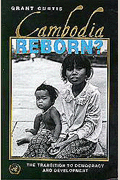When United Nations sponsored elections were held in 1993, there were high hopes that Cambodia would finally be able to escape the nightmare of war, the killing fields, famine, and economic turmoil that its people had endured since 1970. Large amounts of international development assistance, a rapidly expanding NGO sector, and a pragmatic power-sharing arrangement between former adversaries, seemed to bode well for the future. Yet, as the country was once again preparing for elections in 1998, serious tensions and conflicts continued to undermine the transition process.
This book examines Cambodia’s uneasy renaissance from years of conflict, isolation and authoritarian rule. It assesses, in particular, the efforts of the government, NGOs, and the international community to facilitate Cambodia’s various transitions to peace, democracy, and a market economy, as well as the strengthening of civil society.
Copublished with the United Nations Research Institute for Social Development
Author
Grant Curtis, a development administrator and political scientist, lived in Cambodia from 1987 through 1993 and undertook several field visits to the country from 1994 to 1997. During this time he worked with NGOs, United Nations agencies, and the Rehabilitation and Economic Affairs Component of the United Nations Transitional Authority in Cambodia (UNTAC).

